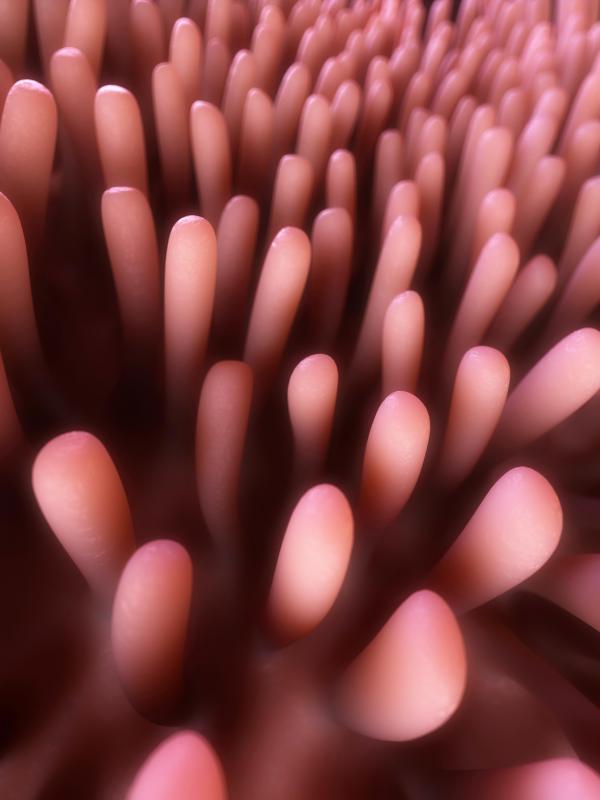At TheHealthBoard, we're committed to delivering accurate, trustworthy information. Our expert-authored content is rigorously fact-checked and sourced from credible authorities. Discover how we uphold the highest standards in providing you with reliable knowledge.
What Is the Role of Absorption in the Digestive System?
The two primary roles of the digestive process are absorption and secretion. The role of absorption in the digestive system is vital to the body because without it, the vitamins, minerals, carbohydrates and other nutrients we consume could not be used. Absorption is the process by which the nutrients in food are passed on to the blood. The majority of absorption occurs in the small intestine, the digestive tract’s primary organ.
After food passes through the stomach to the small intestines, it is turned into energy for the body to use. Absorption is made possible by the villi, small bristle-like protrusions in the mucosa. The mucosa is the moist tissue lining certain parts of the body’s passages and organs. The villi act as channels through which the nutrients derived from digested foods can pass into the bloodstream and be carried to the rest of the body. The actual absorption process is slightly different for each type of nutrient.

The vast majority of absorption in the digestive system occurs in the duodenum and jejeunum, specific sections of the small intestines located about two-thirds of the way down from the entrance. Carbohydrates, fats, and proteins are digested and absorbed, and the body sees that it gets the most use out of each. Digestive enzymes found in the small intestine are responsible for breaking down and converting certain foods into useable energy. Some individuals lack specific enzymes, which results in the inability to digest certain nutrients. The inability to digest or change certain foods into useable energy means that those nutrients are not absorbed, but stay in the digestive system.

While the majority of absorption occurs in the small intestines, absorption is also important to the large intestine. The undigested and non-useful nutrients from foods that are not absorbed in the small intestine pass through to the large intestine. The organ absorbs water and sodium, and through a process of exchanges, turns undigested and unneeded nutrients into waste, which is secreted as fecal matter.

Feces are mostly water, with the bulk comprised of bacteria and undigested matter. Mucus is what acts as a bile binder, giving “normal” feces a solid composition. Interference with excess mucus, bacteria, undigested and unabsorbed foods is what changes the composition of bowel movements from normal to abnormal, serving as an indicator that a virus, food-borne bacteria, or digestive problems are present. If the body somehow interferes with absorption in the digestive system, other symptoms may occur, including stomach cramping, nausea, indigestion, and vitamin deficiency.
AS FEATURED ON:
AS FEATURED ON:















Discussion Comments
We recently went to a museum where they had a really good human body display and they had a demonstration for the kids about the digestive system which you could probably do at home.
They mashed up some food with a potato masher, and that was like grinding it with teeth, and then they mixed it with "acid" which I think was just green water. Then they put it into some stockings as the intestines and squeezed the water out to show what was left.
Very messy, but effective and the kids loved it.
@pleonasm - The problem with that is that you really need fiber in order to maintain a healthy gut and artificial fiber (the kind you get in powders and pills) isn't as efficient for you as real fiber.
Not to mention that I don't think eating as little as possible will make you live longer. The body is supposed to eat. If you restrict it a little bit it might have benefits (although I'd be interested to see what research on humans would find) but I don't think you can extrapolate that to making people eat the bare minimum so that their digestive systems don't have to work hard. I think that would just result in a weak digestive system.
I read an article a couple of months ago about a guy who had made a formula that contained all the nutrients that a person needed to survive and nothing else. He basically said that his digestive system absorbed almost everything and that he only moved his bowels once a week or so.
He seemed to think this was a very good thing and would lead to greater health, as there is a theory that the more you eat (even if you only eat healthy foods and never put on weight) the shorter you will live, because the body has to wear itself out in order to process food.
They've done experiments with rats where they restrict their food and the rats on the strict diet live something like 20% longer than the rats on the less strict diet.
Post your comments